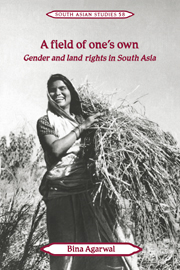Book contents
- Frontmatter
- Contents
- List of illustrations
- List of tables
- Preface
- Map 1.1 South Asia: provincial/state divisions
- 1 Land rights for women: making the case
- 2 Conceptualizing gender relations
- 3 Customary rights and associated practices
- 4 Erosion and disinheritance: traditionally matrilineal and bilateral communities
- 5 Contemporary laws: contestation and content
- 6 Whose share? Who claims? The gap between law and practice
- 7 Whose land? Who commands? The gap between ownership and control
- 8 Tracing cross-regional diversities
- 9 Struggles over resources, struggles over meanings
- 10 The long march ahead
- Definitions
- Glossary
- References
- Index
- Cambridge South Asian Studies
4 - Erosion and disinheritance: traditionally matrilineal and bilateral communities
Published online by Cambridge University Press: 14 January 2010
- Frontmatter
- Contents
- List of illustrations
- List of tables
- Preface
- Map 1.1 South Asia: provincial/state divisions
- 1 Land rights for women: making the case
- 2 Conceptualizing gender relations
- 3 Customary rights and associated practices
- 4 Erosion and disinheritance: traditionally matrilineal and bilateral communities
- 5 Contemporary laws: contestation and content
- 6 Whose share? Who claims? The gap between law and practice
- 7 Whose land? Who commands? The gap between ownership and control
- 8 Tracing cross-regional diversities
- 9 Struggles over resources, struggles over meanings
- 10 The long march ahead
- Definitions
- Glossary
- References
- Index
- Cambridge South Asian Studies
Summary
Apart from being a ‘more wanted fellow’, the [Nayar] husband now also feels that it is ‘in keeping with his dignity’ that he be the one to run things for his wife, and his children … Today the wife is expected to be faithful, to look after her ‘husband's needs’ and to listen to him, though she can oppose his decisions if she feels they are not in the best interest of her tavari.
(Mencher 1962: 241)Matrilineal and bilateral systems of land inheritance advantaged women in many respects, especially in granting them economic and social security, and considerable autonomy and equality in marital relations. These systems, however, did not remain fixed over time. Interventions by the colonial and post-colonial States, particularly in the legal and economic spheres, and the complex processes of social and cultural change which these set in motion, eroded customary practices. The large joint family estates came to be partitioned; formerly egalitarian tribal societies grew economically differentiated; there was an increasing penetration of market forces; there were notable shifts in the techniques of production, the social division of labour, and land relations; sexual mores altered; and patriarchal ideologies spread in influence. Women, in particular, were profoundly affected by these changes. At the same time, their customary exclusion from major authority in public bodies meant that they were unlikely to be the ones directing the change, and were seldom in a position to effectively protect their interests.
- Type
- Chapter
- Information
- A Field of One's OwnGender and Land Rights in South Asia, pp. 153 - 197Publisher: Cambridge University PressPrint publication year: 1995

